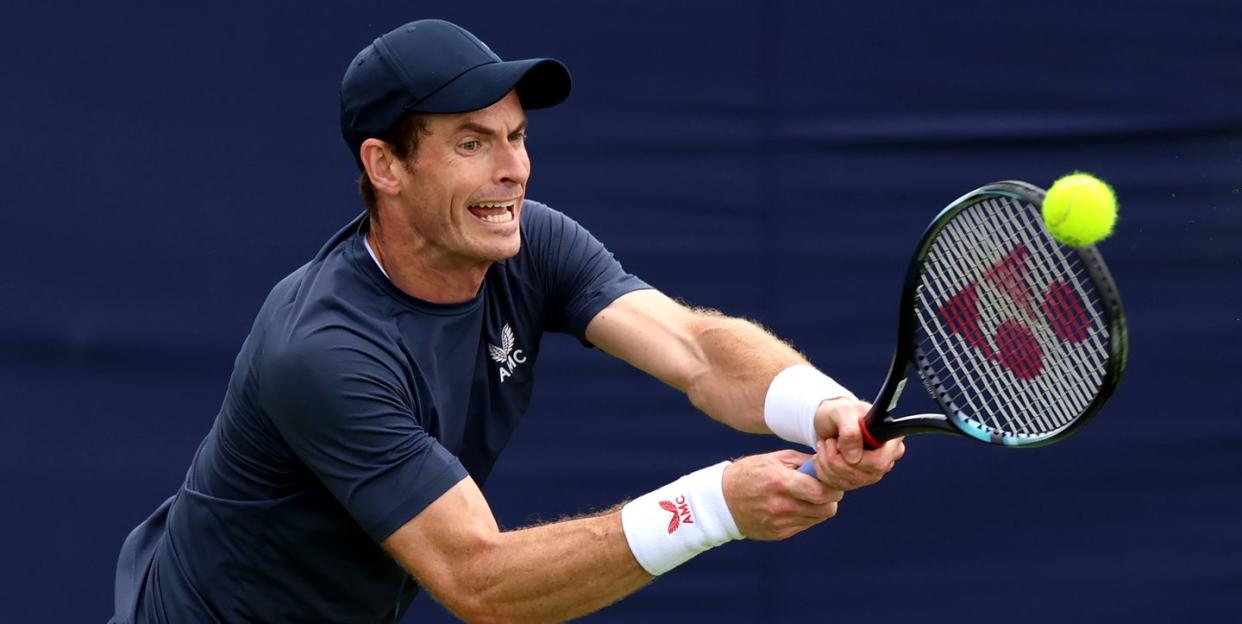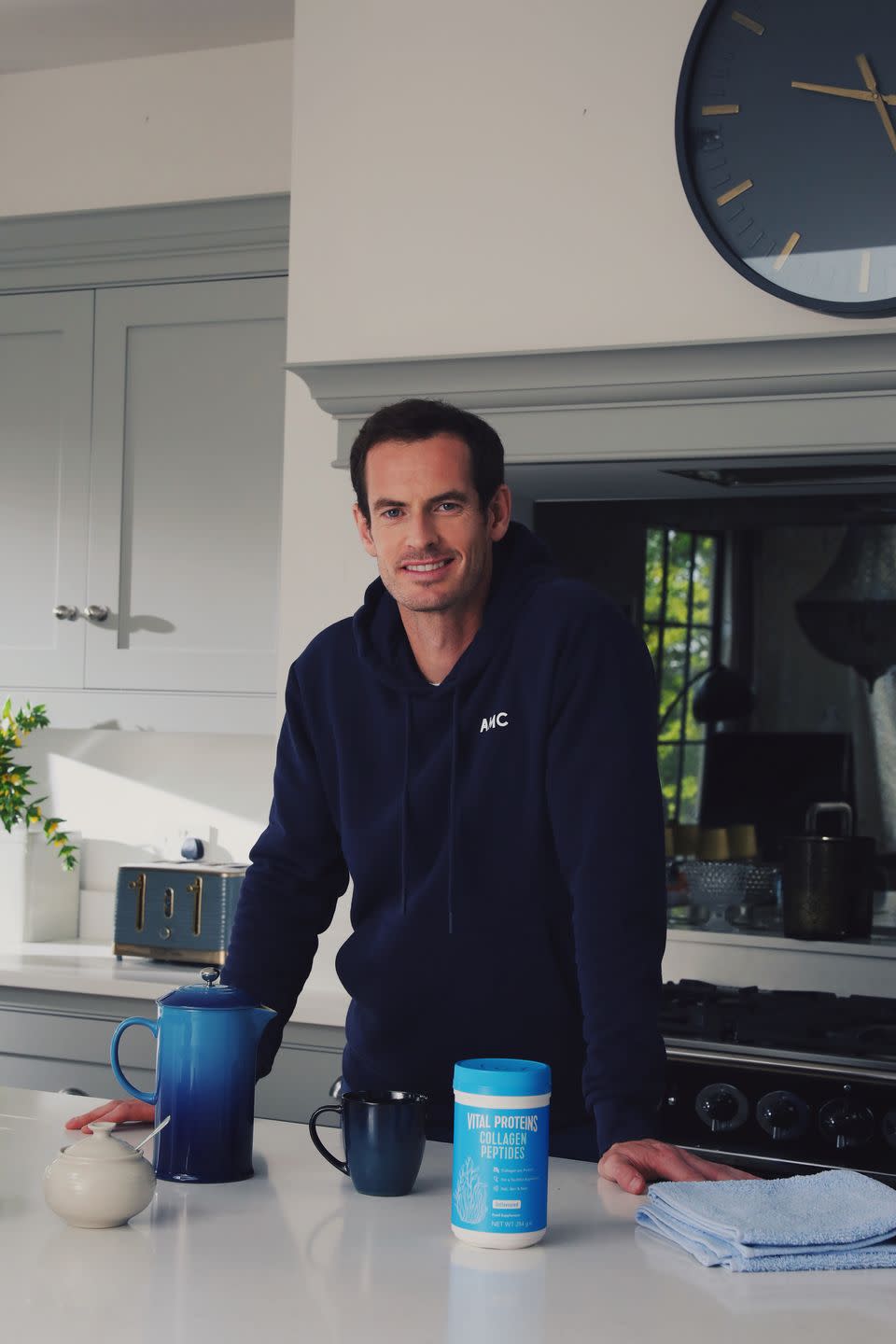The Routine Andy Murray Swears by Including Ice Baths and 4,000 Calories a Day

In his 19 years on the court, tennis champion Andy Murray has amassed three Grand Slam titles, a Davis Cup, and two Olympic singles gold medals. Now, in light of Emma Raducanu withdrawing from their mixed doubles match, it may seem like this could be the end of Murray's stint at Wimbledon. However, in a recent interview with Men's Health, he revealed that "the will to win is still there" as he prepares for his 2024 matches.
What habits does the 37-year-old Scot credit for his achievements? Post-match sushi, ice baths, and a hefty daily intake of 4,000 calories. Murray collaborates with Vital Proteins collagen to support his active lifestyle and recovery after tennis matches.
He shares insights into the training, diet, and mindset that drive the multiple Grand Slam champion's success.
The Training
'I train in the gym most days and we try to work the whole body,' says Murray. 'Not always on the same day but throughout the week. I do a lot of strength training. So deadlifts, squats, one legged squats, bench presses. I use a resistance band to strengthen my shoulders and upper back.'
For cardio, Murray favours an exercise bike, VersaClimber, or sprint training on the court. He also emphasises core training due to its crucial role in providing stability and power in tennis. 'I do planks and side planks, hanging leg raises, and oblique twists using a cable machine or resistance band,' he shared.
With Murray's history of unfortunate injuries, it comes as no surprise that rehab moves are also a focal point of his training. 'I stretch my lower back and mobilise my hips when I’m warming up,' says Murray. 'I use a medicine ball on court when we are training to help load my movement and strengthen my glutes and lower back which then supports my hip.
'At the end of every gym session there’s usually a big chunk of stretching as well and that’s usually with my physio, Shane. There is always a balance between rehabbing and giving your body time to recover naturally, especially at my age – my strength and conditioning coach and my physio monitor that closely.'
The Diet
Murray consumes a massive 4,000 calories a day. Juggling his own diet while ensuring he has breakfast served for his four children is easier said than done.
'I don’t eat with the children apart from breakfast, so that makes things easier. It means I don’t eat their leftovers which I’ve heard is terrible for your diet,' says Murray. 'It’s definitely much harder for me to stick to being good with my diet when I’m at home.
'When I’m travelling, I eat pretty well because there aren’t cupboards full of biscuits to tempt me, or ice cream. I find ice cream quite hard to resist. I am pretty good with routine and I’m still really motivated, so that keeps me focussed with my eating. I work with a nutritionist so I get weekly meal plans and advice, and I try to follow that as closely as I can.'

Pre-match Murray will eat two hours before he's on court. Usually a mix of protein and carbs – 'like a bowl of pasta or rice with a chicken breast or sometimes a chicken Caesar salad.'
Hydration is also an important factor, too. 'I used to cramp a lot, so it’s something I started a few years ago. I drink a big bottle of water with electrolytes in the two hours before my match. I don’t really snack much. There was a big pick n mix selection at Queens and I know a lot of the other players get stuck in, but I try not to. I will have a banana sometimes just before I go on court..
And post match?
'My nutritionist has recommended that I eat 30 minutes after a match to help my body with its recovery,' he says. 'I’m also starving when I come off court. Sushi is my favourite thing to eat so if that’s available, I’ll go for that. I usually eat two boxes of sushi straight away and then I’ll have a third box after my press conference. My favourite sushi is spicy tuna and avocado rolls, with spicy mayo on the side.'
The Mindset
No stranger to adversity, Murray has had a lot to contend with in the last year. Towards the end of his match in Miami in March he suffered a severe injury to his ankle.
'It’s been a difficult year for me,' Murray admits. 'I haven’t always been playing the way I’ve wanted to and I’ve had a few setbacks with injuries. I’m still really motivated for every match, even though I’m coming to the end of my career. The will to win is still there.'
Like many elite athletes, Murray welcomes the pressure that comes with the sport. It's an opportunity to focus: 'As I’ve got older I’ve got much better at dealing with the pressure. I actually enjoy feeling nervous before matches, because I think it helps me focus. I feed a lot off the crowd and I probably play some of my best tennis when I’m under fire, so it’s not something that worries me too much.'
The Recovery
'It's a tough balance because as a tennis player you are used to playing through the pain,' he says. 'There’s almost always a niggle that you are managing. But unless it’s chronic you carry on.
'I also like pushing myself to the absolute max. I like training 'til I’ve got nothing left. That’s when I feel I’m at my best physically and mentally. When I’m on court, I always push myself.
'I’m better now at appreciating the importance of recovery. I didn’t used to take many days off, but now I know how important the rest days are, both from a mental and physical point of view. I do use ice baths, and sauna and steam rooms – mainly the ice bath as that helps with any pain or muscle soreness and inflammation after a match or after training,'
Murray also ensures he sees his physio every day, before and after training and matches. 'That’s a really important part of my recovery, and I find it helps unwind me mentally as well. '
Andy Murray's Morning Routine
7am:
'I usually train in the morning wherever I am, so I get up fairly early, around 7am. I’m a pretty good sleeper, usually getting eight hours a night, and I don’t get too affected by jet lag, so getting out of bed isn’t normally a problem. At the moment, I’m reading Harry Potter before bed – my daughter’s recommendation. We usually watch a bit of Netflix in the evening too. I used to scroll through my phone but reading definitely helps me switch off better.'
7.15am:
'I shower and get changed into my training kit and then it’s time for breakfast. Having a good breakfast is important, especially as I’m training or competing most days. I need to consume at least 4,000 calories a day. I’ll usually start off with a smoothie which I make myself, and some fruit. I’ll then make a bagel with mashed banana or egg, and finish with a yoghurt. I also started drinking coffee a couple of years ago and I’ve become quite a coffee fanatic. I usually have a cup in the morning before training with an added scoop of collagen.'
7.45am:
'If I’m at home my routine is pretty chaotic. I’m often the one that makes breakfast for the children and sometimes that means four different breakfasts as they all like different things. It’s a bit like a breakfast buffet! I like to drop the children to school if I’m at home – I’m still away so much of the time, and even if I’m at home, I don’t get back home until late, so it’s the best opportunity for me to spend time with them all. The grass court season gives me a bit more time at home as we don’t start on court until later, so it’s nice to be able to spend that quality time with my family.'
'If I’m away at a tournament, I usually eat breakfast with my team in the hotel and we chat about the plan for the week. It’s a good time for everyone to run through ideas and the schedule.'
9am:
'Then I pack my bag with everything I need for the day and it’s off to training, which is either on court or in the gym. I meet two hours before I’m due on court and get some treatment from my physio, Shane, who has been with me for a while now and knows how to look after my body. I then warm up in the gym and on court. This usually takes about 30-45 minutes and I do this before I start hitting any balls.'
You Might Also Like


